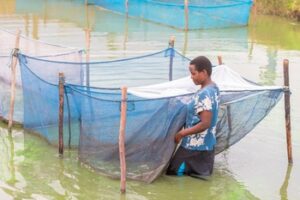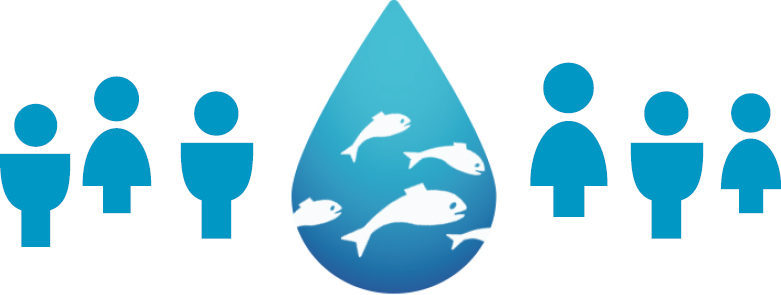Achievements and Successes of the BMZ Project “Sustainable Aquaculture and Fisheries”
Achievements and Successes of the BMZ Project “Sustainable Aquaculture and Fisheries”
The objective of the GIZs Global Programme “Sustainable Fisheries and Aquaculture” is to enhance access to more fish and higher incomes derived from sustainable and resource-friendly fisheries and aquaculture for the population facing food insecurity. In two country-modules, Malawi and Madagascar, the successes were analysed and evaluated in concluding studies.

The Aquaculture Value Chain Project (AVCP) in Malawi and the Project Sustainable Aquaculture in Madagascar (Projet d’Aquaculture Durable Madagascar, PADM) both aimed to achieve the programme’s objectives through sustainable aquaculture practices. In Malawi and Madagascar, the projects have collectively demonstrated substantial achievements. For example, since the beginning of these projects, the production has almost doubled to over 980 tons of fish per year from aquaculture and rice-fish farming in the target areas, of which 80 % are available for the food insecure population. Consequently, also the income and jobs in the fish value chain increased accordingly.
In Malawi AVCP was highly successful, exceeding its targets. It stimulated the aquaculture sub-sector at multiple levels, significantly enhancing innovation capacity of all actors along the value chain. Key innovative approaches like the nationally recognized aquaculture manual, the farmer-to-farmer approach, the energy-efficient oven and smoking kiln Chitofu 3 in 1, the Multi-Stakeholder Platform Aquaculture Round Table (Aqua RT), and the intermittent harvest system for mixed-sex Tilapia cultures were developed, piloted, and institutionalized. The AquaRT improved national and regional coordination, networking, legislative power, and economic influence among stakeholders.
The project also facilitated peer-to-peer learning within the SADC region and encouraged local solutions by national governments and donors, including a high share of female beneficiaries. Despite challenges like high demand for fingerlings and fish feed, and limited access to finance for smallholder fish farmers, fish is increasingly recognized as a vital income source and affordable protein. This is reflected in national agendas and policy documents, including guidelines on fingerling production and the nationally recognized manual on good aquaculture practices.
Likewise, PADM was highly successful, acting as a development laboratory for inland aquaculture innovation in Madagascar. It created customized solutions for the development of a sustainable aquaculture sector that are feasible for vulnerable rural populations. These were disseminated through capacity building and training. Such happened in collaboration with the NGOs NorgesVel and Tilapia de l´Est on the east coast: A new cooperative of farmers was established and trained for improved performance and availability of animal feed for sustainable agriculture. Based on a vulnerability analysis to climate change and adaptation strategy the project has trained rice-fish farmers in climate-resilient practices and published a manual on “best practices” for sustainable freshwater aquaculture.
The acceptance and further development of pond-fish and rice-fish farming in regional contexts led to political recognition of aquaculture as a promising sector for development and combating malnutrition. The project implemented a multi-level approach involving civil society, politics, and the private sector. Positive outcomes included increased income, employment, and improved nutrition for the local population, motivating continued support for inland aquaculture in Madagascar.
The success of these projects is due to their practice-oriented approach, continuous stakeholder engagement, and alignment with agro-ecological contexts of the different regions and beneficiary needs. Follow-up training loops ensured the application of learned practices. National strategies, such as PDACM, now recognize inland aquaculture’s potential for disadvantaged rural populations, with growing demand for sector support and guidance. Furthermore, lessons and innovations from Madagascar’s and Malawi’s small-scale subsistence aquaculture are being transferred to other countries of the Global Programme.
GIZ will continue enhancing the aquaculture sub-sector in Malawi and Madagascar through the new project on Sustainable Aquatic Foods.
For more information, articles and training manuals of the Global Programme Sustainable Fisheries and Aquaculture, visit our website: More fish and income from sustainable fisheries and aquaculture – giz.de
